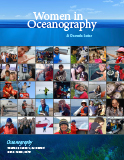Full Text
Upon hearing that I had been selected one of Popular Science magazine's "Brilliant 10" young scientists last year, a rush of emotions came over me. First I was doubtful. Then humbled, flattered, elated, and terrified—in that order, all within a matter of seconds. Being called "brilliant" made me cringe. Every time that word gets repeated in a press release, progress review, or speaker introduction, I still cringe. Am I smart? Sure. Do I generate good ideas, work hard, and disseminate good, reliable results with proper interpretations? Sure. No confidence issues there. But brilliant??? Not by a mile. I can quickly generate a mental list of brilliant scientists, and not for a second can I reasonably accept that I belong among their ranks. This feeling of self-doubt, frequently dubbed "impostor syndrome," has plagued me for many years.
It's easy to think other people are more productive, smarter, faster, work harder, or have better work-life balance. This sort of thinking and self-doubt can certainly be damaging. Aside from sucking up valuable time, brainpower, and energy, impostor syndrome can be truly confidence shaking. To the extent that some scientists suffer (junior, female scientists seem to be disproportionately afflicted), this syndrome is damaging and can even be personally debilitating or fatal for a scientific career. But is impostor syndrome all bad? If a magic confidence pill existed to cure impostor syndrome, should all assistant professors take it? Maybe not. Impostor syndrome keeps you on your toes. It keeps you continually striving to be better. Striving to be the person who your colleagues/students/mentors think you are. To work extra hard on that review because you're not sure you're the one Nature or the National Science Foundation should be asking to evaluate the work or ideas of the leaders in the field. To dedicate your heart and soul toward preparing and giving a memorable presentation that you can be proud of. Finally, impostor syndrome keeps you honest and humble. Complete elimination of this phenomenon would probably lead to an overabundance of self-proclaimed geniuses running around.
Because even the best among us suffer from impostor syndrome, I would like to suggest a few positive steps we can take toward combating impostor syndrome without becoming a league of narcissists.
1) Focus on your proud moments. Embrace and remember that positive sensation you get when you know you did a good job. And realize that your nagging self-doubt, however annoying it may be, likely contributed to your doing a good job in an effort to prove yourself. Don't focus on what others think, or on all the failures along the way, or on the never-ending to-do list. You will never believe the positive hype that you hear about yourself if you can't compile your proud moments and focus your attention on them. Determine your priorities, and catalog your achievements toward these goals. If you're not making progress in the areas that are most important to you, consider shifting your efforts to the things you value the most.
2) Emulate your idols. Think of the people you really, truly respect in different areas of your field (e.g., scientific ideas, presentation skills, teaching, personal qualities that make them good collaborators or good parents; think broadly about the characteristics that you value). Think about why you respect these people and strive to emulate these characteristics into your life (and maybe notice that you're already more like them than you recognize or give yourself credit for). Think about whether any of these people might also struggle with impostor syndrome. Most likely, at least one person on your list does, at least in one aspect of his or her life. That's ridiculous, right? After all, they are your science idols, and how could anyone that influential to you possibly be insecure…believe it, there are things they doubt. They might even be shocked to find out that they were on someone's "science idols" list. And they most likely have their own lists of people that they strive to be more like.
3) Promote each other. Many of the rewards/honors/invitations in science are based on nominations, and very frequently these recognitions require self-nomination, an idea that is absolutely petrifying to us impostors. Knowing how hard it is for each of us to believe in our own brilliance and worth, it is critical that we support and promote our colleagues in similar situations. Don't hesitate to step up and nominate scientists whom you respect for prestigious awards. Or encourage them to apply themselves by telling them how qualified you think they are and/or offering to write them a strong letter of support. Suggest junior speakers for a high-profile plenary session or invite them to give a seminar at your institution. Give other people (especially those who you sense might be struggling with impostor syndrome) a chance to shine. The people with the worst impostor syndrome will often work the hardest to make sure they don't disappoint. This will become a proud moment for them, and success begets success. Maybe next time they won't write off applying for a highly prestigious scholarship or accepting a position that makes them slightly uncomfortable, just because they remember that someone important to them (by the way, this is YOU) believed in them.
In the end, it's about believing in yourself and taking risks and positive steps to step out of your comfort zone to combat impostor syndrome. Because that is a daunting task, you may find it easier to push toward elevating the careers and confidence of the people you most respect. Finally, build and record your own moments of pride, and try to remember that when your colleagues call you "brilliant," they probably really mean it, even if you can't quite accept it (yet).

